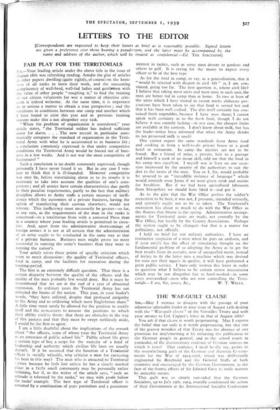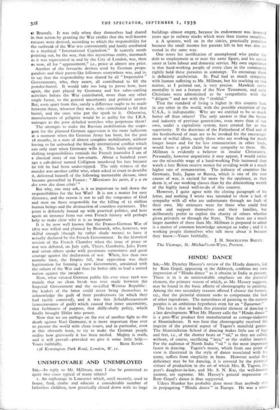THE WAR-GUILT CLAUSE
SIR,—May I venture to disagree with the passage of your otherwise admirable leader in your issue of August I tth dealing with the " War-guilt clause " of the Versailles Treaty and with your answer to Col. Capper's letter in that of August18th?
You ask if that clause is worth perpetuating. May I express the belief that not only is it worth perpetuating, but that one of the gravest mistakes of that Treaty was the absence of any provision for implementing it by enforcing the publication to the German people in general, and to the school youth in particular, of the documentary evidence of German sources on which it rests? That evidence, I need hardly say, points to the overwhelming guilt of the German and Austrian Govern- ments for the War of 1914-1918, which was deliberately engineered by Berchtold and the General Staffs of both countries and encouraged by the German Government, in the face of the frantic efforts of Sir Edward Grey to settle matters by amicable means.
This guilt was so clearly one-sided that the German Socialists, up to July 29th, 1914, roundly condemned the action of their Government at the International Socialist Conference at Brussels. It was only when they themselves had shared in that action by granting the War credits that the well-known excuses were devised, according to which the responsibility for the outbreak of the War was conveniently and hazily attributed to a mythical " International Capitalism." It scarcely needs pointing out, by the way, that this mysterious entity, inasmuch as it was represented in and by the City of London, was, then as now, all for " appeasement," i.e., peace at almost any price.
Another of the favourite devices used by German propa- gandists and their parrot-like followers everywhere was, and is, to say that the responsibility was shared by all " Imperialist " Governments, who, they assert, all contributed to fill the powder-barrel. It would take too long to prove how, here again, the part played by Germany and her sabre-rattling activities before the War contributed, more than any other single factor, to the general uncertainty and political unrest. But, even apart from this, surely a difference ought to be made between those, whoever they were, who contributed to fill that barrel, and the ones who put the spark to it. Otherwise, manufacturers of gelignite would be as guilty for the I.R.A. outrages as the poor deluded wretches who perpetrate them!
The attempts to make the Russian mobilisation the scape- goat for the planned German aggression is the more ludicrous at a moment when the German Army has been, for the past IS months, in a state of almost complete mobilisation, without having so far unleashed the bloody international conflict which can only start when Germany wills it. This futile attempt at shifting responsibilities reminds the French journalist I am of a classical story of our law-courts. About a hundred years ago a cab-driver named Collignon murdered his fare because he felt he had been under-tipped. The only witness of the murder was another cabby who, when asked in court to describe it, delivered himself of the following memorable dictum, since become proverbial in France : "Messieurs les jures, it y a eu des torts des deux cotes! "
' But why, one may ask, is it so important to nail down the responsibilities for the last War? It is not a matter for easy rhetorics, and the reason is not to call the vengeance of God and men on those responsible for the killing of 12 million human beings and the destruction of countless existences. The point is definitely bound up with practical politics, and here again an instance from our own French history will perhaps help to make clear why it is so important.
It is by now well known that the Franco-German War of 187o was willed and planned by Bismarck, who, however, was skilful enough (though by rather shady means) to have it actually declared by the French Government. In the historical session of the French Chamber when the issue of peace or war was debated, on July 15th, Thiers, Gambetta, Jules Ferry and seven others spoke with passionate earnestness and great courage against the declaration of war. When, less than two months later, the Empire fell, that opposition was their legitimation for forming a new Government, untainted with the odium of the War and thus far better able to lead a united nation against the invaders.
Now, what vitiated German public life ever since 1918 was mainly that no clean break was ever made between the Imperial Government and the so-called Weimar Republic: the leaders of the latter could never bring themselves to acknowledge the guilt of their predecessors (in which they had tacitly connived), and it was this Schuldbewusstsein (consciousness of guilt) which caused that inner uncertainty, that feebleness of purpose, that shilly-shally policy, which finally brought Hitler into power.
Now that we are perhaps on the eve of another fight to the death against Nazi Germany, it is more important than ever to present the world with clean issues, and in particular, even at this eleventh hour, to try to make the German people realise how grievously it has been misled. Mighty is truth, and it will prevail—provided we give it some little help.—



































 Previous page
Previous page